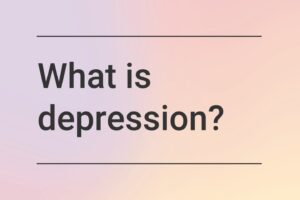Depression is a common mental health issue that affects many people. If you are struggling with depression, you may feel like there is no hope. However, there are many things you can do to improve your mental health and reduce your symptoms of depression. One of the most effective methods is meditation. In this blog post, we will discuss how meditation can help relieve symptoms of depression and improve your overall mental health.
Contents
What Is Depression?

Depression is a mental health disorder that is characterized by persistent feelings of sadness and loss of interest in activities that were once enjoyed. Depression can also cause physical symptoms, such as fatigue, body aches, and headaches. People with depression may have difficulty concentrating, sleeping, or making decisions.
Depression is more than just feeling blue; it is a serious medical condition that can be disabling if not treated. According to the National Institutes of Health (NIH), an estimated 16 million adults in the United States had at least one major episode of depression in 2015. Depression is the leading cause of disability worldwide and is a major contributor to suicide.
People also experience depression differently. Some people may feel hopeless, while others may be irritable or angry. Some people may lose interest in activities that they once enjoyed, while others may eat more or sleep more than usual.
Treating depression is important for your overall health and well-being. While there are many different treatment options available, meditation is an effective way to reduce symptoms of depression and improve mental health.
There are many treatment methods like cognitive behavioral therapy, medication, and other treatments.
What is Meditation?
Meditation is a practice of mindfulness that can be done anywhere and at any time. Mindfulness is the act of being present in the moment and observing your thoughts, feelings, and surroundings without judgment. When you meditate, you focus your attention on your breath or an object in front of you and let other thoughts come and go without getting attached to them.
Over time, regular meditation can help you to become more aware of your thoughts and emotions as they arise. This can help you to better manage difficult situations and reduce stress levels. Meditation is an effective way to reduce symptoms of depression and improve mental health.
How Does Meditation For Depression Work?

Meditation for depression works by helping you to focus on the present moment and letting go of intrusive thoughts and worries about the future. It teaches you how to control and focus your attention, which can help to break the cycle of negative thinking that can lead to depression.
There are many different types of meditation, but all involve focusing your attention on something – whether it be your breath, a mantra or a certain word or phrase that you repeat to yourself, or an object in front of you. To get the most out of meditation for depression, it’s important to find a type that suits you and stick with it.
Meditation works by calming the mind and body, and research has shown that it can be an effective treatment for depression. A study published in the Journal of Consulting and Clinical Psychology found that people who participated in an eight-week mindfulness-based meditation program had significantly reduced symptoms of depression, compared to those who didn’t participate in the program.
Other studies have also shown that meditation can help to reduce stress, anxiety, and negative emotions, all of which can contribute to depression. Meditation is thought to work by changing the way we react to stressful situations, making us more resilient to stress and less likely to experience negative emotions.
Types of Meditation For Depression

There are many types of meditation, and each one can help manage depression in its way. Some of the most popular types of meditation include:
Mindfulness Meditation
Mindfulness meditation is all about focus and concentration. The goal is to bring your attention to the present moment, without judgment. This can help you become more aware of your thoughts and feelings, and learn how to manage them healthily. This type of meditation also has the added benefit of reducing stress and anxiety. People may prefer mindfulness meditation because it can be done anywhere, at any time. Some of these mindfulness mediation ways are:
- Body scan: This involves focusing on each part of your body, from head to toe. As you focus on each area, notice any sensations you feel, such as tension or pain.
- Breathing meditation: This involves focusing on your breath as it moves in and out of your body. As you breathe, try to pay attention to the way your chest or belly rises and falls.
- Sitting meditation: This involves sitting still and focusing on your breath or a mantra (a word or phrase that you repeat to yourself). The goal is to clear your mind of all other thoughts.
Guided Meditation
Guided meditation is a type of mindfulness meditation where you listen to a recorded voice that gives you instructions. This can be helpful if you find it difficult to focus on your own, or if you need some extra support. Guided meditation is also a good option if you’re new to meditation and want to try it out before committing to practice on your own. Some of these guide meditation types are:
- Visualization: This involves focusing on positive images and scenarios. The goal is to help you relax and feel better by picturing yourself in a peaceful or happy place.
- Progressive muscle relaxation: This involves tensing and relaxing different muscle groups in your body. As you tense each muscle, pay attention to the way it feels. Then, as you relax the muscle, notice the difference in how it feels. This can help you become more aware of tension in your body and learn how to release it.
Transcendental Meditation
Transcendental meditation is a specific type of mantra meditation that uses a personal mantra, or sound, that’s assigned to you by a teacher. This type of meditation is usually practiced for 20 minutes twice a day. The goal is to transcend, or go beyond, your thoughts and feelings. This can help you find inner peace and calmness.
Some of these types of transcendental meditation are:
- Chanting: One type of transcendental meditation involves chanting a mantra out loud. This can help you focus on the sound of the mantra and clear your mind of other thoughts.
- Silent repetition: Another type of transcendental meditation involves silently repeating the mantra to yourself. This can help you focus on the meaning of the mantra and find inner peace.
Loving-kindness meditation
Loving-kindness meditation is all about generating feelings of compassion and kindness. The goal is to direct these positive emotions towards yourself and others. This can help you develop a more positive outlook on life and find compassion for yourself and others.
Some of these types of loving-kindness meditation are:
- Self-compassion: One type of loving-kindness meditation involves directing compassion towards yourself. This can help you learn to be kinder to yourself and ease any self-judgment or criticism you may be experiencing.
- Compassion for others: Another type of loving-kindness meditation involves directing compassion toward others. This can help you develop empathy and understanding for the people in your life.
- Mantras: Mantras are positive phrases or affirmations that you repeat to yourself during meditation. The goal is to focus on the meaning of the mantra and let go of any negative thoughts.
How To Get Started With Meditation for Depression?

Starting with meditation for depression can be very simple. There are many ways why people may want to start meditating, but the most important factor is the willingness to give it a try. If you are feeling depressed, anxious, or stressed, then it is likely that your mind is full of racing thoughts. Meditation can help to slow down these thoughts and allow you to focus on the moment.
The first step is finding a comfortable place to sit or lie down. may want to close your eyes and focus on your breath. he in slowly and deeply through your nose, and then exhale slowly through your mouth. Try to focus on the sensation of your breath moving in and out of your body. If you find your mind wandering, simply bring your attention back to your breath.
You may also want to focus on a mantra or a simple word or phrase that you repeat to yourself. For example, you could say “I am calm” or “I am at peace.” can also try different breathing exercises, such as counting your breaths or inhaling for a count of four and then exhaling for a count of eight.
Meditation is not about clearing your mind completely; it is simply about letting go of the constant chatter and focusing on the present moment. The more you practice, the easier it will become to quiet your mind. In time, you may find that meditation provides relief from depression symptoms and helps to improve your overall mental health.
Conclusion
Meditation is an effective tool for reducing symptoms of depression and improving mental health. However, it is important to remember that meditation is not a panacea. If you are struggling with depression, it is important to seek professional help. In addition to meditation, there are many other effective treatments for depression, such as medication, therapy, and lifestyle changes.
If you are interested in trying meditation for depression, there are many resources available to help you get started. There are plenty of books, websites, and apps that can teach you how to meditate. Once you have learned the basics of meditation, you can start practicing on your own. If you find that you’re struggling to stick with it or don’t see any benefits after a few weeks, consider seeking help.
Hope this article was of help to you! If you are suffering from depression, you may seek help from Therapy Mantra. We have a team of highly trained and experienced therapists who can provide you with the tools and skills necessary for overcoming depression. Contact us today to schedule an online therapy or download our free Android or iOS app for more information.


